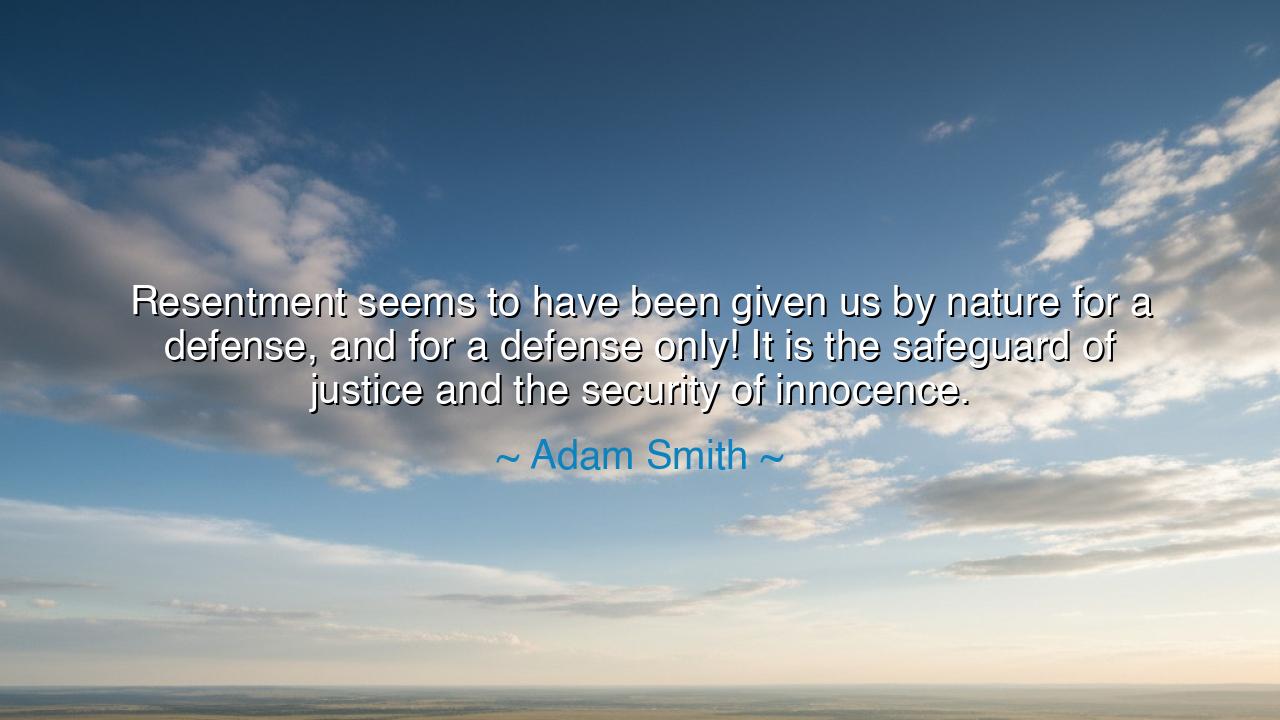
Resentment seems to have been given us by nature for a defense
Resentment seems to have been given us by nature for a defense, and for a defense only! It is the safeguard of justice and the security of innocence.






The Scottish philosopher Adam Smith, better known for his writings on wealth and markets, also pondered the hidden powers of the human heart. In his work The Theory of Moral Sentiments, he declared: “Resentment seems to have been given us by nature for a defense, and for a defense only! It is the safeguard of justice and the security of innocence.” In this solemn teaching, he reveals that resentment, often condemned as a vice, is in truth a gift of nature when rightly directed. It is not meant for cruelty, nor for vengeance, but as a shield—a power by which the weak protect themselves, by which justice is awakened in the face of injury.
To understand this, we must first see that resentment is not mere bitterness. In its primal form, it is the cry of the soul against wrong. When a man is insulted, when an innocent is struck, when injustice is done, resentment rises like a flame. This flame, Smith teaches, is not given for destruction but for defense—to protect what is good and true. It is a natural signal, awakening courage in the timid, sharpening vigilance in the complacent, and reminding all that innocence must not go undefended.
History provides us with mighty examples. Consider Harriet Tubman, born a slave, beaten and oppressed. Her resentment of the injustice of slavery was not poisoned bitterness, but fuel for courage. That flame moved her to risk her life again and again, leading her people to freedom. Or recall the great orator Demosthenes of Athens, who resented the creeping power of Philip of Macedon. His speeches, filled with righteous anger, roused his city to defend its liberty. In both, resentment became not a weapon of hatred but a safeguard of justice, stirring the will to resist oppression.
Smith is careful, however, to add that resentment is for defense only. If it turns to aggression, if it seeks to destroy rather than protect, it becomes corruption. What was meant to guard innocence becomes a tool of cruelty. We see this when revolutions, born of righteous anger, descend into vengeance and terror. The same flame that once protected the weak becomes wildfire, consuming all in its path. Thus, resentment must be yoked to reason, guided by conscience, and checked by law, lest it cease to serve justice and instead become tyranny.
The deeper wisdom here is that nature equips the soul with passions as guardians. Fear warns us of danger. Desire drives us to seek life. And resentment guards the boundaries of justice, stirring indignation when wrong threatens to prevail. To despise resentment entirely is to despise one of nature’s tools; but to worship it is to invite destruction. The noble life is one that takes this passion, like a wild horse, and trains it to serve righteousness, never letting it run loose into blind rage.
The lesson for us, then, is to honor resentment as a servant, not a master. When you feel its flame, ask yourself: am I defending what is right, or merely feeding my pride? Am I protecting innocence, or am I striking out in vanity? If resentment leads you to stand for the weak, to resist injustice, to preserve your dignity with measured strength, then it fulfills its purpose. But if it festers, if it becomes obsession or vengeance, then you have allowed the shield to turn into a sword of cruelty.
Practically, this means cultivating the discipline to pause when wronged. Do not smother resentment, but channel it. Speak when silence would betray justice. Act when action is required to defend yourself or others. But never let resentment harden into hatred, for hatred destroys the very innocence it was meant to protect.
Thus, Adam Smith’s words shine with enduring power: resentment is not our curse but our defense. It is the soul’s sentinel, guarding the gates of justice. Use it rightly, and you become a protector of innocence. Use it wrongly, and you become a destroyer. And so the wise man learns to let his resentment burn only as long as it defends truth—then quenches it, leaving behind the calm strength of justice fulfilled.






AAdministratorAdministrator
Welcome, honored guests. Please leave a comment, we will respond soon